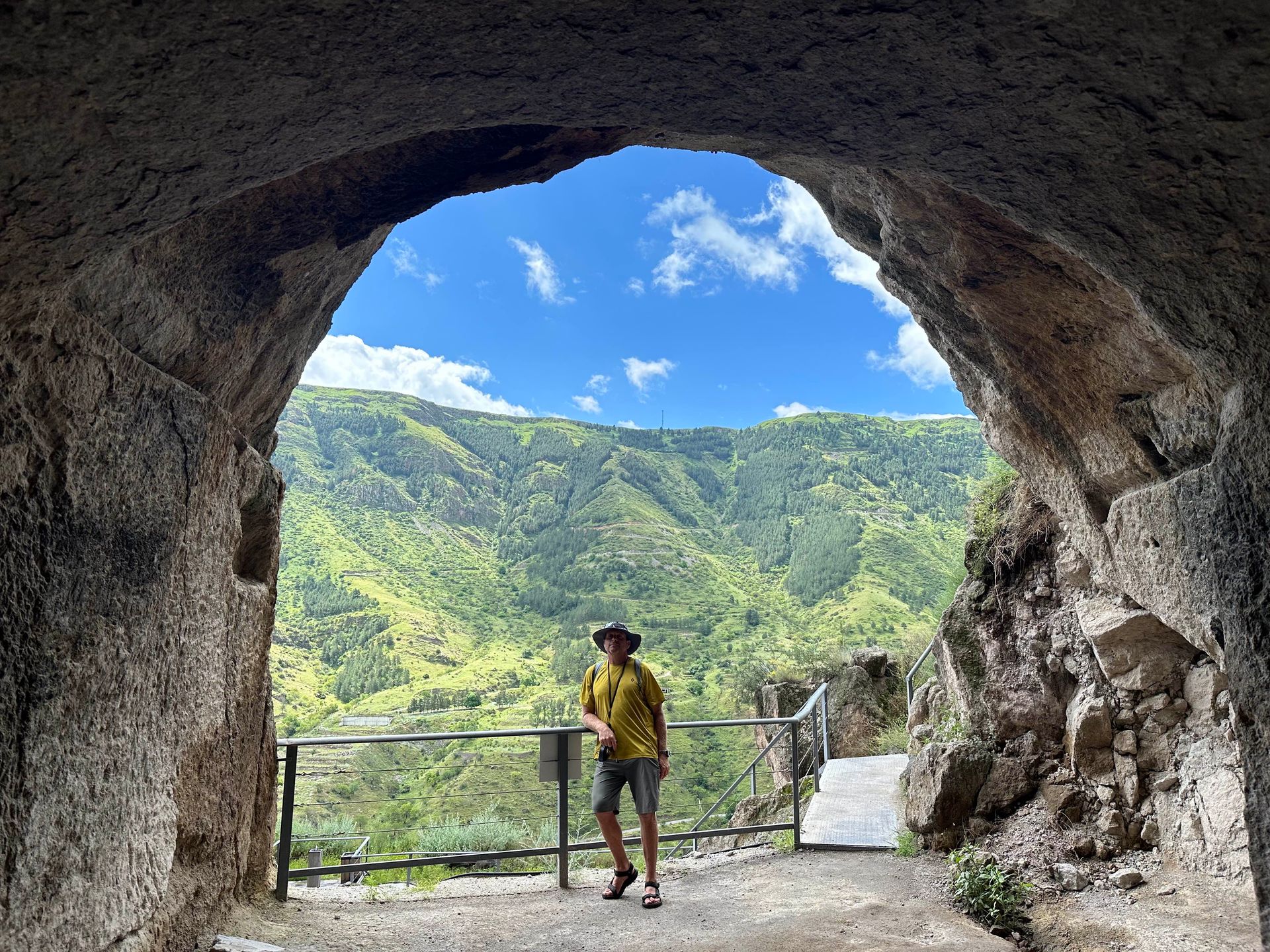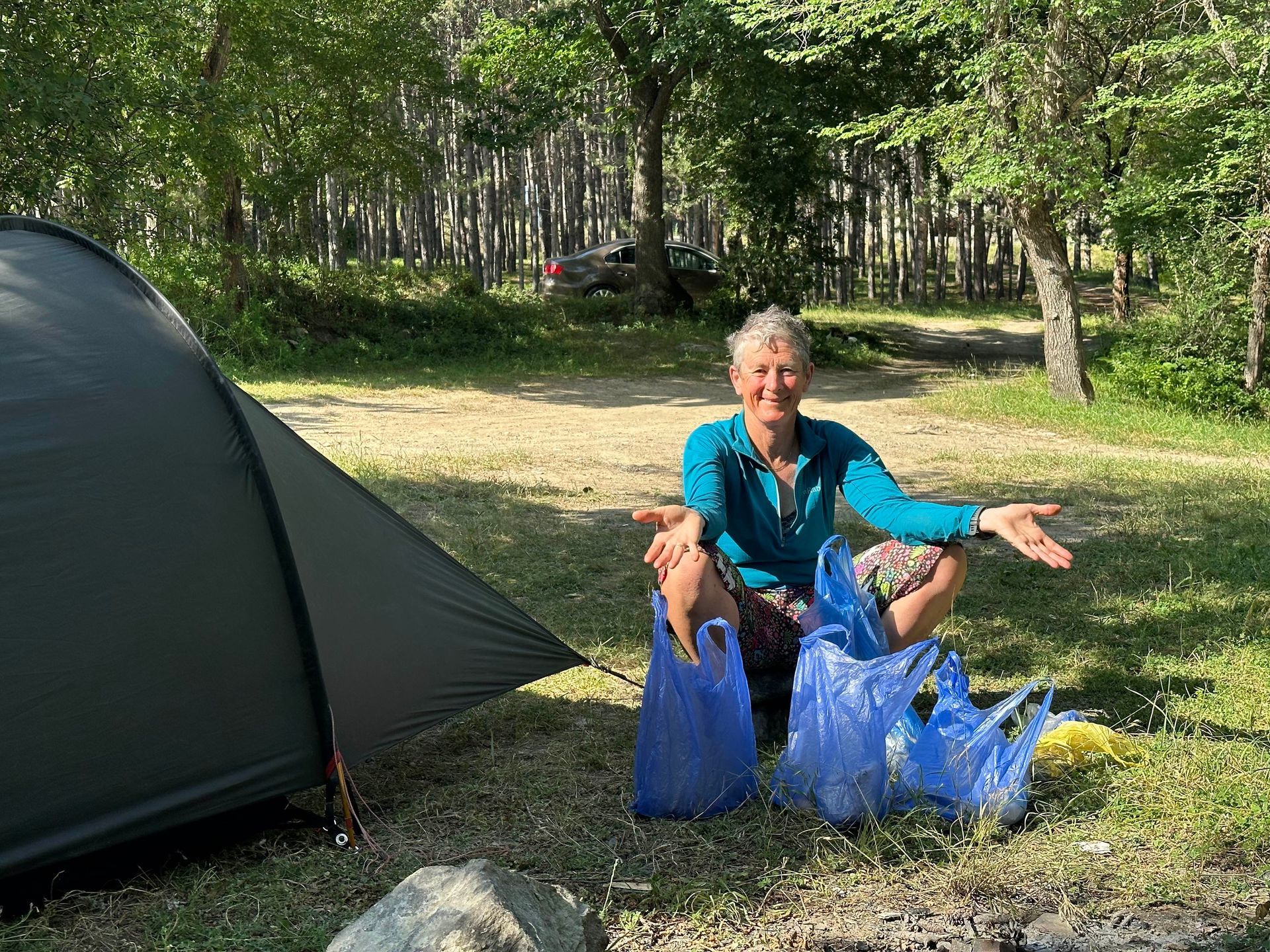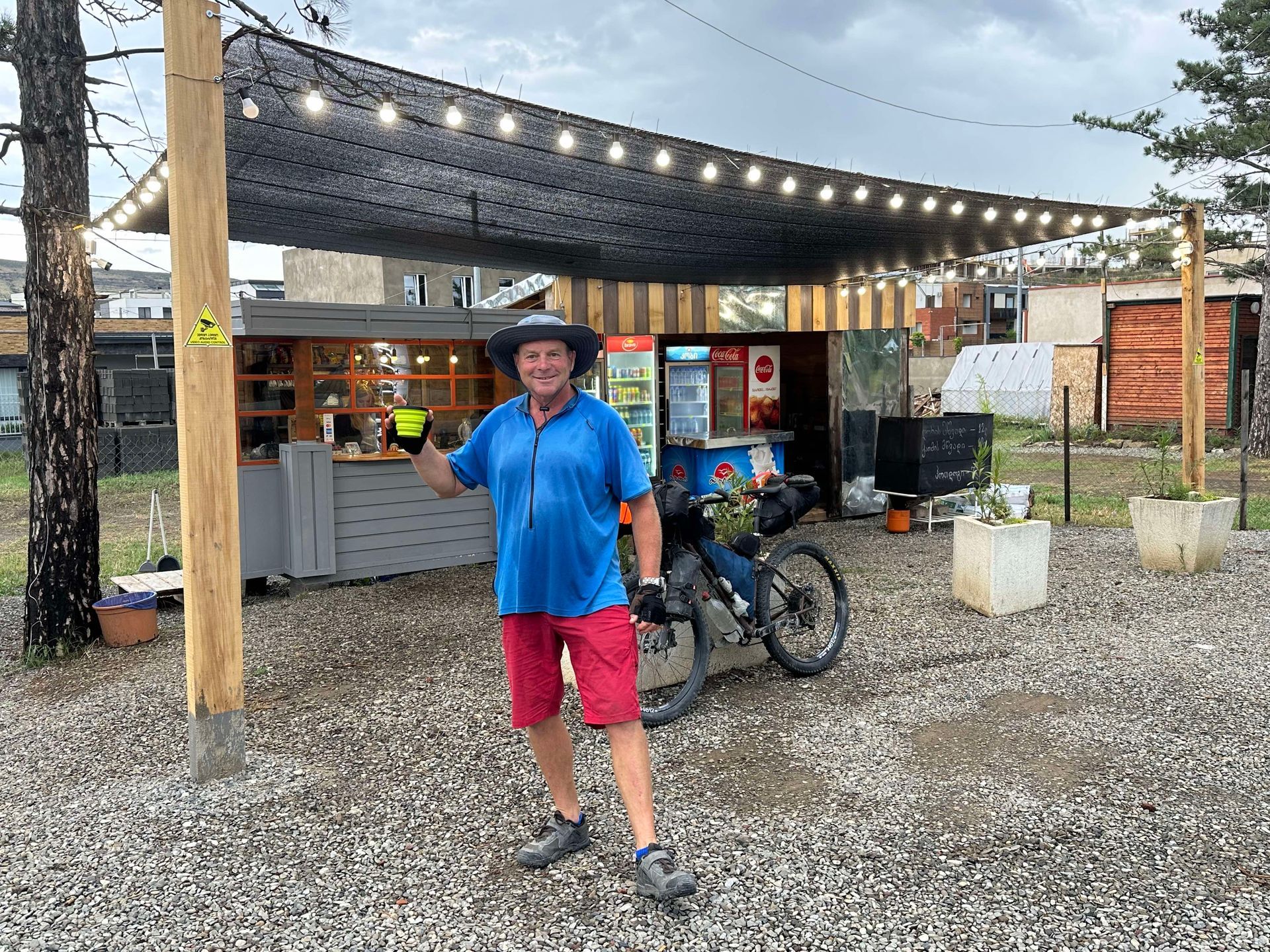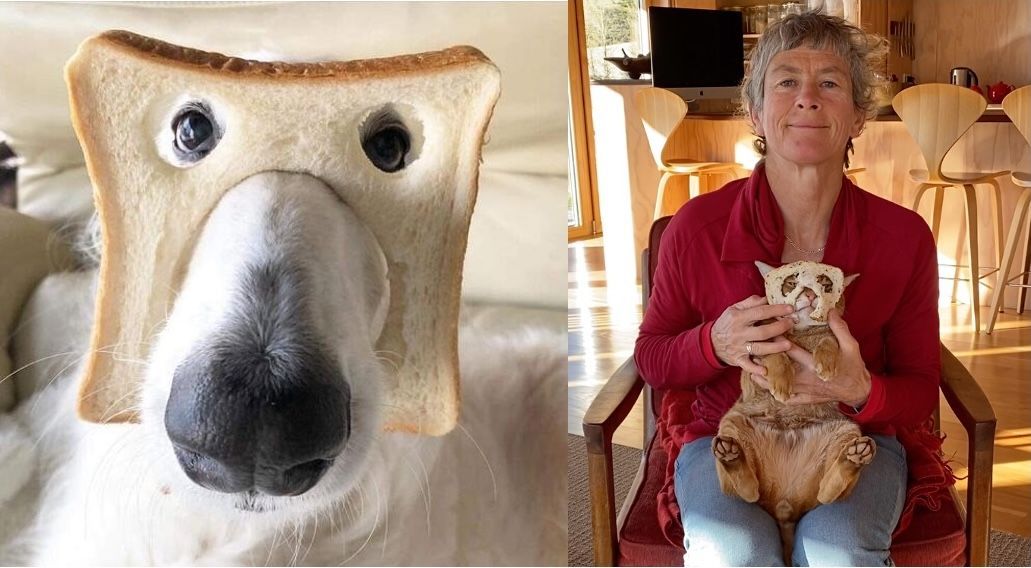What We Need

Chris at Vardzia monastery (dating from the 1100s) with our road from yesterday zigzagging down the hill behind. This picture has nothing whatsoever to do with today's topic but I like it!
When you are cycle touring you become quite aware of the most common types of rubbish on the side of the road. Two reasons – the first is that you are going at a speed where you see the rubbish (unless you are going downhill at 84km/hr like Chris did as a record on this trip). The second is that you are often looking for useful items which other people have considered rubbish. I wrote about this before in Valuable Rags & Rusty Nails.
In Georgia we have been looking for pieces of cloth to clean our bike chains. We have encountered a lot of mud which is not doing the chains or cogs any favours. We brought a Chux cloth from New Zealand which is already applying more dirt to the chain than it is removing. Finding pieces of cloth (most commonly discarded clothes) on the side of the road is usually easy, but not in Georgia. We have found almost no cloth items and the very few pieces of cloth have been ground into the dirt on 4WD tracks.
The rubbish we have found is largely plastic. Endless numbers of plastic water bottles, soft drink bottles, wine bottles, beer bottles, and plastic bags, or pieces thereof. There’s also a selection of food wrapping materials, particularly for ice cream. There’s very little in the way of fast-food wrappers or packaging, most likely because the only fast food outlets we have seen were in Tbilisi.
It's not surprising that the majority of the rubbish is plastic. Shopping in Georgia is an endless succession of trying to refuse plastic bags. Everything comes in a plastic bag and likely then gets amalgamated with your other purchases in a further plastic bag. You buy fruit or vegetables and each type must be plastic bagged, weighted, and then a price label applied. That’s the price of progress, isn’t it? You create an automatic pricing machine and it requires that goods are put in bags to prevent you gaming the system. Although, Georgians don’t require the plastic bags are closed with the price tag, so you still could game the system.
Bag refusal is met with incomprehension. Why wouldn’t you want a plastic bag? So many reasons you can’t explain because you have minimal Georgian language skills and a dictionary isn’t enough. Sometimes pointing at your pack (as in, I already have a bag) does the trick. However, most times you give way to the inevitable, take another plastic bag and try to put it to good use before the flimsy material shreds, becoming plastic fragments, then microplastics, then nanoplastics, to live in our environment for ever more (or at least quite a long time).

Jane with a plethora of Georgian plastic bags
While we’ve been away, New Zealand has become the first country in the world to ban single use plastic bags for grocery items. About time, I say. In the 1990s I suggested my mother stop using plastic grocery bags (I wasn’t using them myself). However, Mum thought the bags were convenient to separate the goods and less annoying for the person at the till, which is true. I also remember, from the same era, buying some socks from Farmers and being told crossly, “You can have it without the bag but it’s your lookout if you get stopped as a potential shoplifter.”
I’m sure people will rapidly become accustomed to doing without bags in which to put their fruit and veges, just like we got used to taking our own shopping bags to the supermarket. Now we have a car full of much longer-lasting supermarket bags!
If we can do without single use plastic bags (and single use plastic plates/cups/cutlery/straws, also included in the NZ legislation), what else can we do without? I’d like to suggest takeaway cups of any sort and buying water in bottles as the next target items I hope will be banned. Some towns and events are attempting to do away with takeaway cups altogether (not even paper ones), like Wanaka and the Lake Hayes & Wanaka A&P shows. However, it would be easier if people stop asking for them.
I have tried to stop using takeaway cups for some years now. If I don’t have a keep cup with me, I don’t allow myself to have a coffee. Same thing with water. If I haven’t brought my own water, or a bottle I can fill, I do without. It’s not like I am going to die from either lack of water in New Zealand, or from lack of coffee! I point out to Chris that doing without is the best reminder to take a keep cup/bottle the next time we go out.

Chris with his keep cup (one of our two cups which double as plates) at a coffee stand before a big hill climb in Georgia
“Why should anyone do without?” I can hear people saying. “We are hardly going to save the planet by doing without takeaway coffee in paper cups. Or doing without this one takeaway coffee in a paper cup. Even if everyone stops having takeaway coffee, that’s not going to stop climate change or make waste problems go away.”
Absolutely true, that sentiment. Doing without takeaway coffee cups won’t stop climate change or significantly alter waste volumes. It won’t save the planet, although that’s because we don’t need to ‘save’ the planet (as I’ve mentioned before, the planet will keep on trucking in some form or another until the sun perishes, at which point it’s curtains for everything). What I feel like doing without takeaway coffee does achieve, however, is put a little glitch in my brain. A hiccup when I want something, an easy thing, a treat, but a treat I know has downstream effects and where I have the power to say “No,” to those effects – it’s about remembering that power. Doing without is only a meaningful or memorable sacrifice if we are doing without something we want – there’s no great feeling of reward in saying “No,” to a single use plastic bag you never wanted anyway.
What about if I’m with other people and they want a takeaway coffee? The way I deal with this situation is by saying, “Sure, go ahead. I won’t have one because I don’t want a takeaway cup and I forgot to bring my keep cup.” The point of my exercise is not to make anyone else change their behaviour, just stick to my own line.
Do I ‘slip up’? Of course! When we had cycled 80km from Telavi to Tbilisi and it was really hot, we stopped at East City Mall to get some sun block. Chris returned with two iced coffees as well as the sunblock in plastic cups with straws. Did I turn the iced coffee down? No way! I drank it and felt energised for the last 10km into Tbilisi. But next time…I’ll try to find more willpower to say, “No thanks.”
For the meantime, I will continue to try to improve my Georgian over the next 5 weeks and become more effective at turning down plastic bags. Wish me luck!







